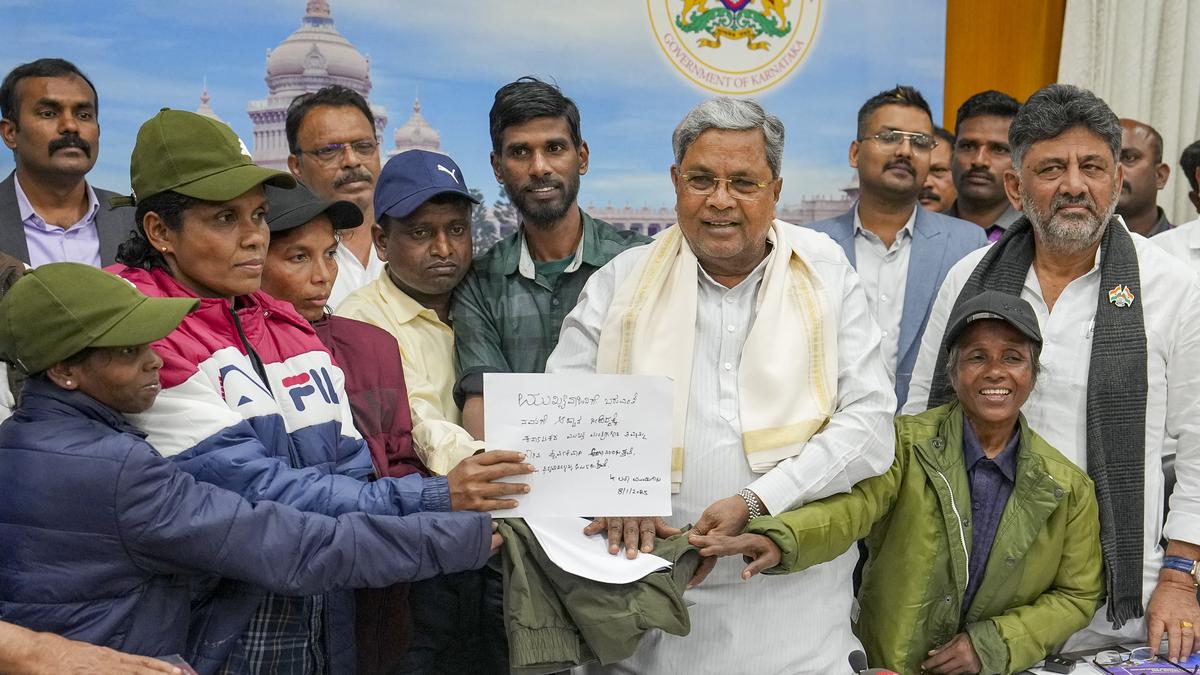 |
|
The recent surrender of six Maoist activists in Karnataka marks a significant turning point in the state's long-standing struggle against Naxalite insurgency. The event, which saw the group's leader, Mundagaru Latha, symbolically hand over her olive green uniform in exchange for a copy of the Indian Constitution, underscores a shift in the dynamics of the conflict. This act, witnessed by Chief Minister Siddaramaiah, represents not only the end of armed resistance for these individuals but also a potential pathway towards a more peaceful future for the region. The surrender comes after months of negotiations and follows the death of another Maoist, Vikram Gowda, in an encounter with the Anti-Naxal Force (ANF) in November 2024, suggesting that the loss of key figures may have played a role in influencing the decision to lay down arms.
The government's response to the surrender has been swift and multifaceted. Chief Minister Siddaramaiah announced that the government would expedite the rehabilitation process for the six former Maoists, adhering to established government policies and legal frameworks. The Deputy Commissioner of Chikkamagaluru has already approved a rehabilitation package, demonstrating the government's commitment to integrating these individuals back into society. Furthermore, the announcement of special fast-track courts to quickly process the legal cases against the surrendered Maoists demonstrates a commitment to both justice and rehabilitation. This approach suggests a recognition that swift legal proceedings are necessary to prevent prolonged legal battles that could hinder the rehabilitation process and potentially erode public confidence.
Beyond the immediate implications for the six individuals, the surrender holds broader significance for Karnataka's overall security landscape. With only one known Maoist activist remaining at large, the state is on the verge of becoming 'Naxal-free,' a significant achievement after years of combating insurgency. The Chief Minister's announcement regarding the potential dissolution of the ANF suggests a reassessment of the state's counter-insurgency strategy, moving away from a primarily militaristic approach towards a more focused effort on addressing the root causes of Naxalism. The government's commitment to addressing the Maoists' demands, which include land distribution for the landless, rejection of the Kasturirangan Committee Report (likely pertaining to forest conservation and tribal rights), and the removal of the national park tag for Kudremukh National Park, indicates a willingness to engage in dialogue and address underlying socio-economic issues that have fueled the Naxalite movement. This strategy represents a shift towards a more comprehensive approach to conflict resolution that encompasses both security measures and socio-economic development.
The surrender of these six Maoists, and the government's approach to rehabilitation, represent a potential model for other regions grappling with similar conflicts. The emphasis on providing concrete economic support, addressing grievances through dialogue, and ensuring swift legal proceedings offers a potential blueprint for integrating former insurgents into society and preventing the resurgence of violence. The success of this approach will depend on the government's ability to deliver on its promises, address the underlying socio-economic issues that fuel discontent, and create an inclusive environment where former combatants can feel safe and secure. The establishment of special fast-track courts, the proposed dialogue with neighboring states regarding pending cases, and the commitment to review the charter of demands presented by the Maoists all demonstrate a willingness to engage in a holistic and comprehensive approach to lasting peace.
However, the complete eradication of Naxalism in Karnataka remains a complex and nuanced challenge. While the surrender is a significant milestone, vigilance and sustained efforts are necessary to prevent the resurgence of insurgency. Addressing the root causes of Naxalism, ensuring equitable distribution of resources, and empowering marginalized communities are critical for building a sustainable peace. The long-term success will not only depend on the government's actions but also on the broader societal commitment to inclusive development and social justice. Only through a multifaceted approach that combines security measures, socio-economic development, and addressing the underlying grievances can Karnataka hope to consolidate this significant victory and prevent any potential future resurgence of Naxal activity. The case of Mareppa Aroli, who pledged half of his rehabilitation package to a local school, exemplifies a potential path towards reconciliation and community building, a vital ingredient in consolidating long-term peace.
Source: Six Maoists surrender before CM, making Karnataka almost ‘Naxal-free’
